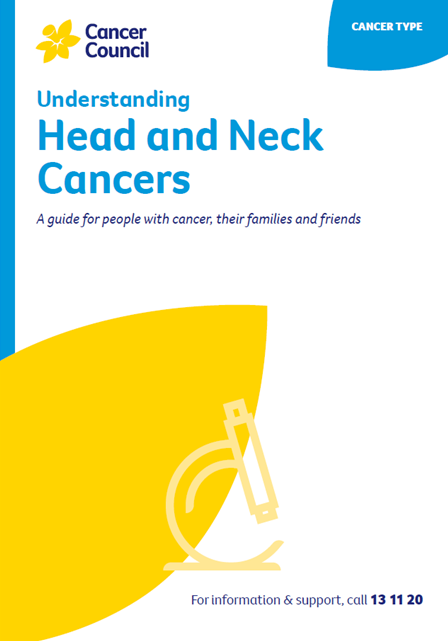- Home
- Head and neck cancers
- Treatment
- Preparing for treatment
Preparing for treatment
It is important to look after your health before treatment begins. This will help you cope with side effects and can improve treatment outcomes.
 | Stop smokingIf you smoke, aim to quit before starting treatment. If you keep smoking, you may not respond as well to treatment, side effects may be worse and you will have a higher risk of a new cancer. See your doctor or call Quitline on 13 7848. |
Begin or continue an exercise programExercise will help build up your strength for recovery. Talk to your doctor, physiotherapist or an exercise physiologist about the right type of exercise for you. | |
Improve diet and nutritionA dietitian can suggest ways to get the right nutrition before, during and after treatment by changing your diet or taking liquid nutritional supplements. This will help maintain your weight and muscle mass, improve your strength and energy levels, and may mean the treatment works better. | |
Avoid alcoholAlcohol irritates mouth sores from the cancer or treatment. | |
See a dentistTreatments for head and neck cancer can affect your mouth, gums and teeth. Your specialist may refer you to a dentist or oral medicine specialist who understands the treatments you will be having. You will need a full check-up and an oral health care plan covering any dental work you need and how to care for your mouth. |
→ READ MORE: Surgery for head and neck cancers
Podcast: Making Treatment Decisions
Listen to more of our podcast for people affected by cancer
More resources
A/Prof Martin Batstone, Oral and Maxillofacial Surgeon and Director of the Maxillofacial Unit, Royal Brisbane and Women’s Hospital, QLD; Polly Baldwin, 13 11 20 Consultant, Cancer Council SA; Martin Boyle, Consumer; Dr Teresa Brown, Assistant Director Dietetics, Royal Brisbane and Women’s Hospital, Honorary Associate Professor, University of Queensland, QLD; Dr Hayley Dixon, Head, Clinical Support Dentistry Department, WSLHD Oral Health Services, Public Health Dentistry Specialist, NSW; Head and Neck Cancer Care Nursing Team, Royal Melbourne Hospital, VIC; Rhys Hughes, Senior Speech Pathologist, Peter MacCallum Cancer Centre, VIC; Dr Annette Lim, Medical Oncologist and Clinician Researcher – Head and Neck and Non-melanoma Skin Cancer, Peter MacCallum Cancer Centre, VIC; Dr Sweet Ping Ng, Radiation Oncologist, Austin Health, VIC; Deb Pickersgill, Senior Clinical Exercise Physiologist, Queensland Sports Medicine Centre, QLD; John Spurr, Consumer; Kate Woodhead, Physiotherapist, St Vincent’s Health, Melbourne, VIC; A/Prof Sue-Ching Yeoh, Oral Medicine Specialist, University of Sydney, Sydney Oral Medicine, Royal Prince Alfred Hospital, Chris O’Brien Lifehouse, NSW.
View the Cancer Council NSW editorial policy.
View all publications or call 13 11 20 for free printed copies.



